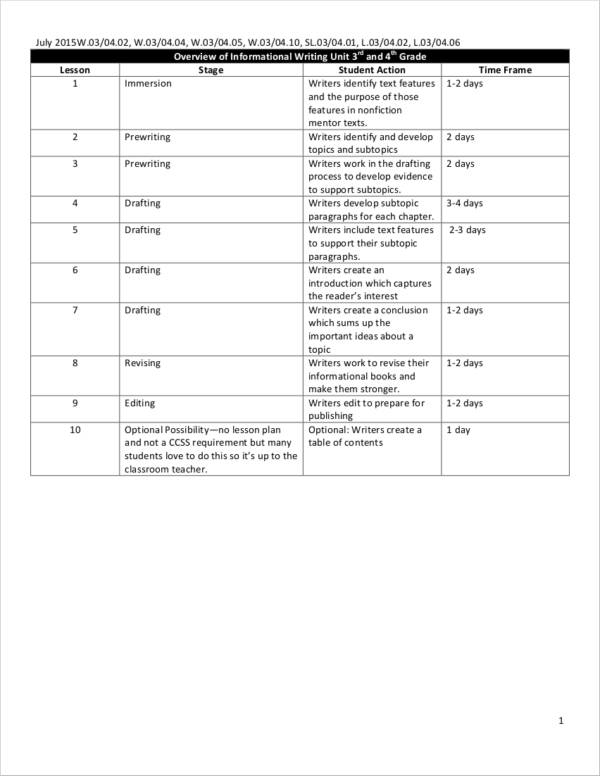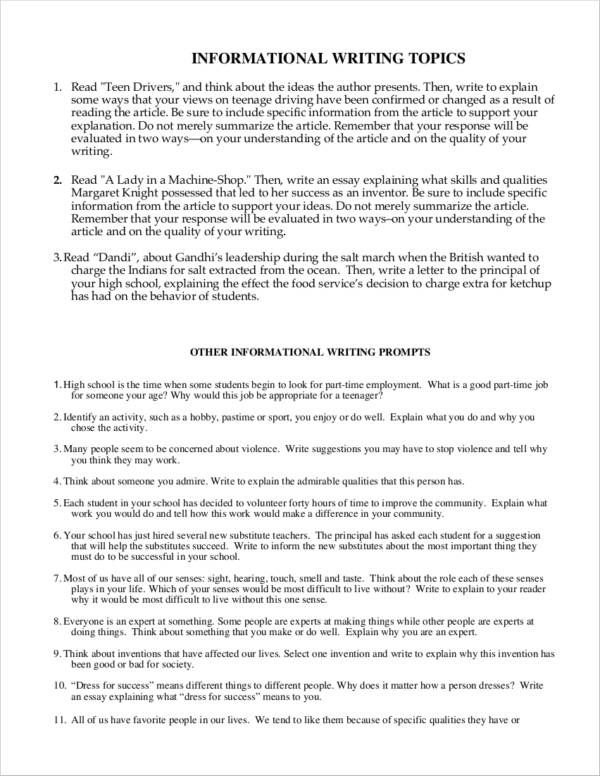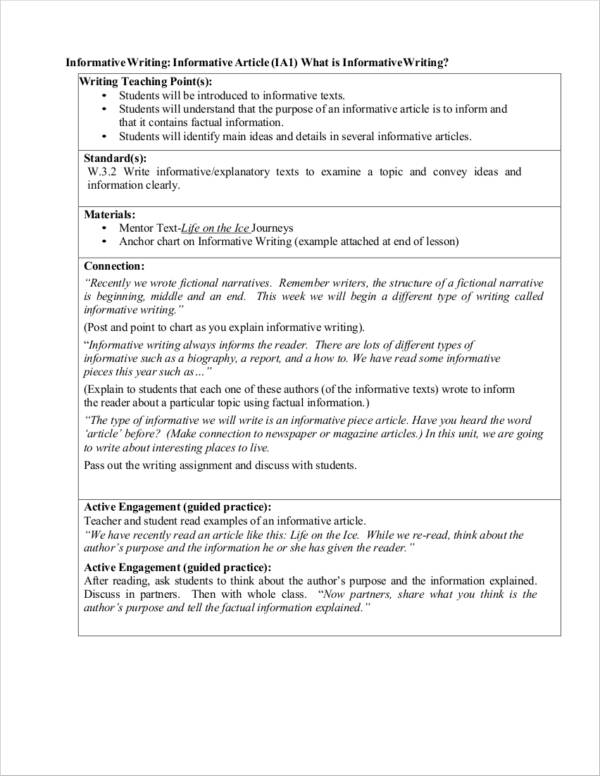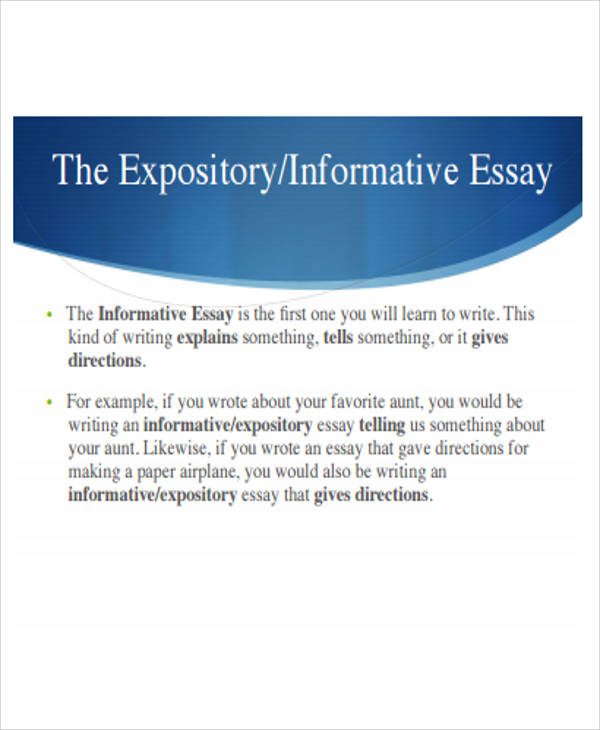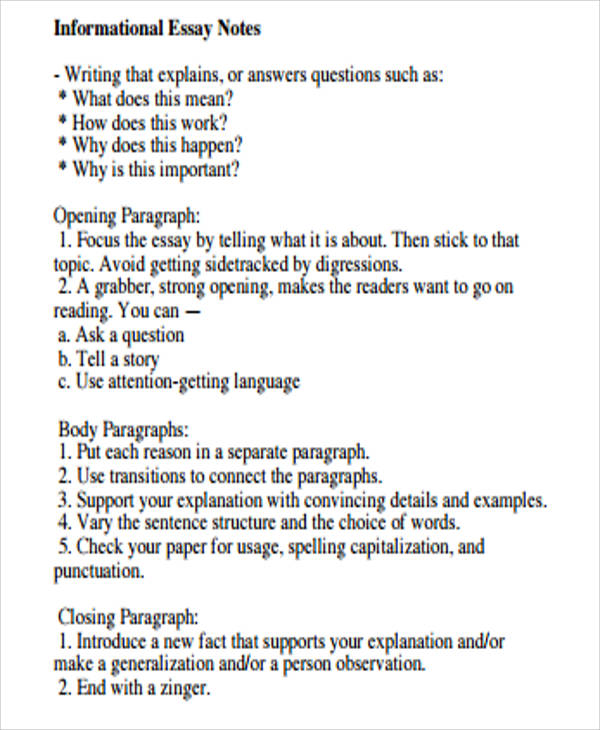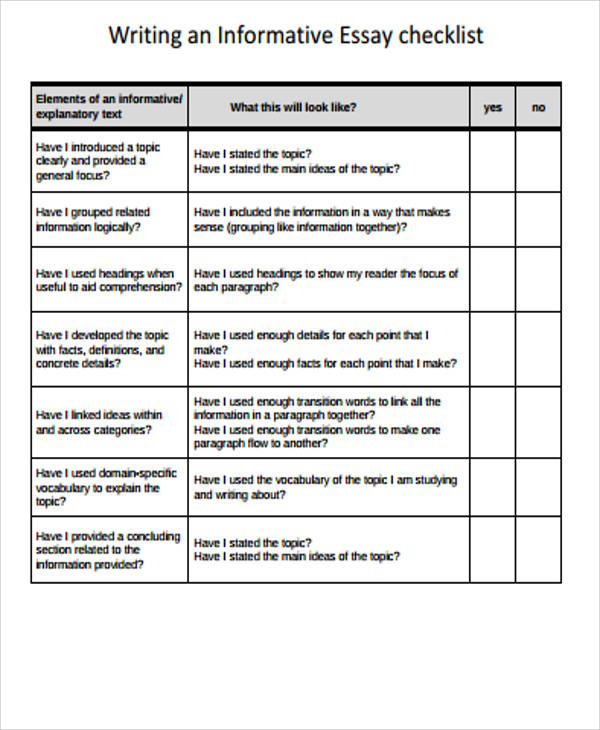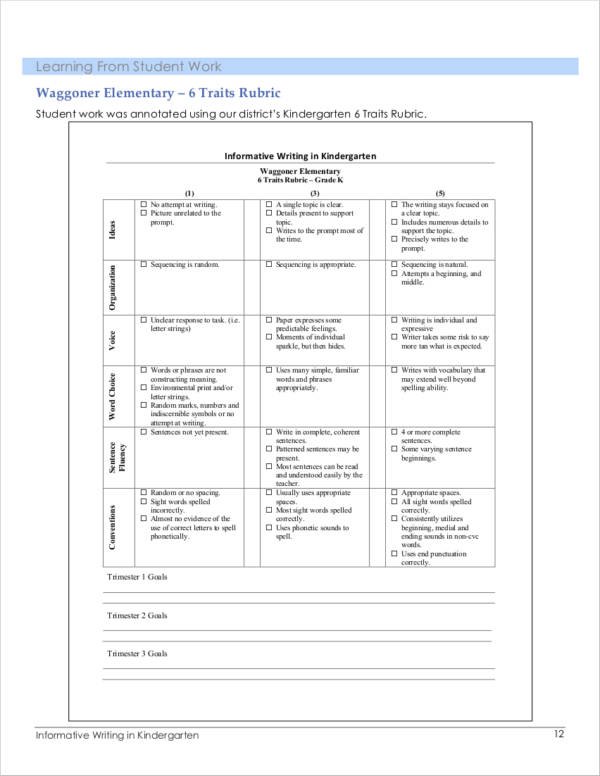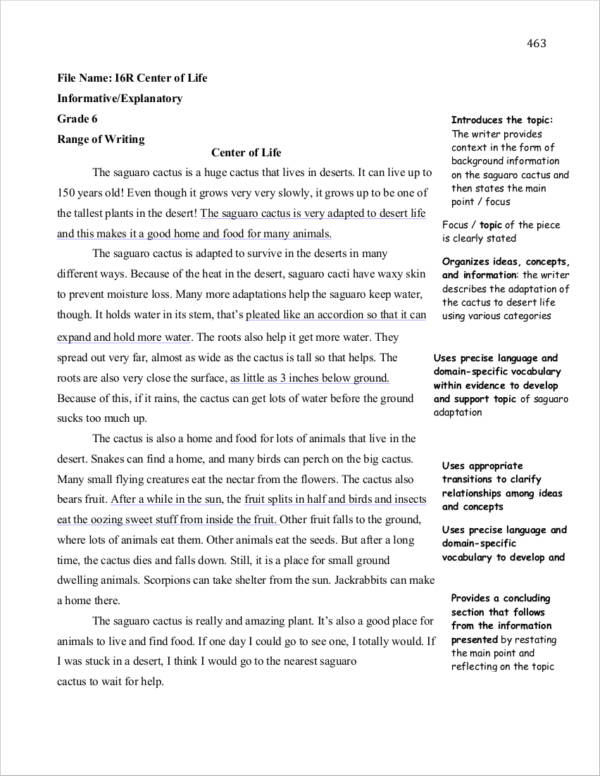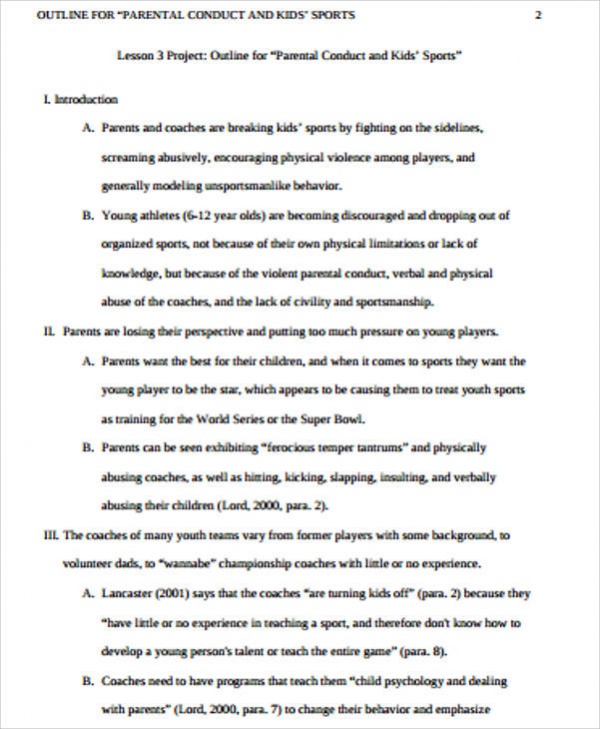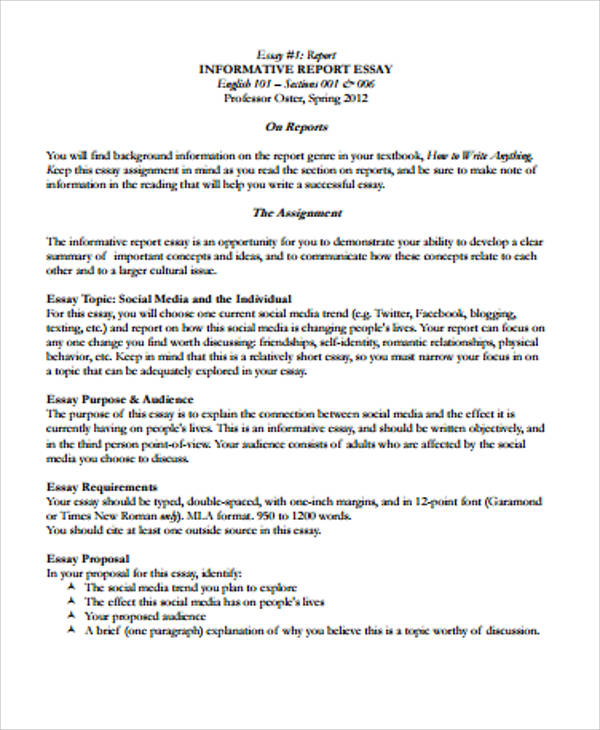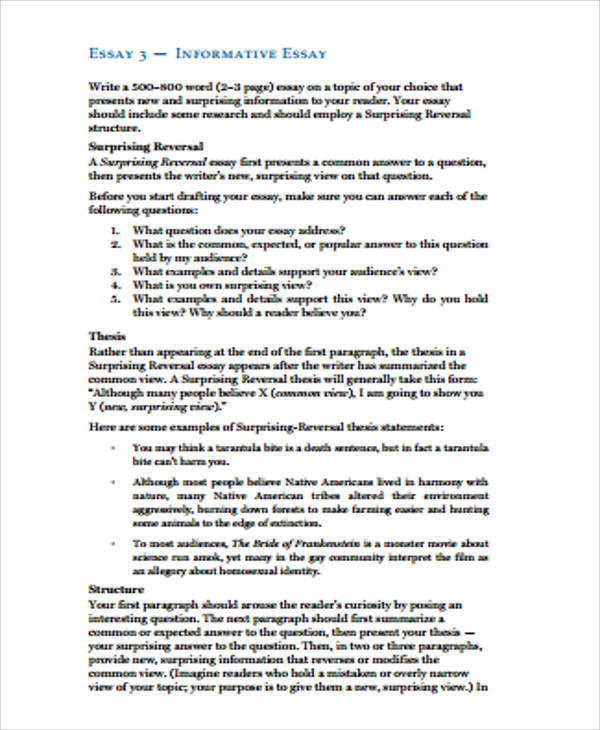Informative writing aims to be able to properly present information in a detailed manner. The writer also aims to give the reader a better comprehension of the topic at hand. Basically, informative writing aims to answer the what, why, and how. To get a good start with informative writing, you should start with information that you already know and supplement it with information that you have researched. Relevant examples and details must be included as well. Informative writing is also known as explanatory writing.
Are you in need of informative writing samples and templates? Worry not as we have them here for you. We have about 10+ sample informative speech and essays that will help you out with your informative writing task.
Grade School Informational Writing Unit
Informational Writing Prompt Samples
Informational Writing Sample Guide
Expository/Informative Essay
Informative Essay Notes in PDF
Common Characteristics of an Informative Essay
The common characteristics of informative writing are as follows:
- Relays information in a detailed and accurate manner.
- It includes summaries or instructions.
- Explains a procedure.
What are the Different Parts of an Informative Essay?
Informative essays are typically common for school or academic-related requirements. Informative essays try to express facts instead of personal opinions. To ensure that your informative essays end up being well-written, here’s how you should present it.
Introduction
Like any other type of essay writing, your informative essay should include an introductory paragraph. This will be the part of the essay where you will establish what the topic of your essay is as well as the main points of your essay. You can write this as a thesis statement to make your essay introduction more solid. Your introduction will also serve as an overview of what you will be discussing in the body of the essay. Around five to eight sentences will be sufficient for your introduction.
Body
There is no limit to the number of paragraphs that you might want to include in your essay unless there is a required number of paragraphs or words needed. Normally, it is up to the writer how long or short he/she wants the essay to be. You may also insert your own opinion or ideas about the topic at hand. However, you should still remember to not overpower the facts.
Conclusion
Your conclusion should close off the essay and should also give a short recap of what you have discussed. This is the section of your essay where you will actually insert a lot of your own opinions. This section need not be too long. A few sentences or one paragraph will be enough, but just like the body, the length of your conclusion will all depend on you.
References
Since an informative essay packs a ton of facts and references, it’s just right that you include these in your paper. This is highly important if you are getting facts or quoting a couple of statements from other write-ups. Typically, this is not included in the main parts of the essay. It is usually written on a separate page. It will include the following:
- The title of the article or book
- Chapter (if applicable)
- Page number
- The website source
Informative Essay Checklist
Informative Writing in Kindergarten Rubric
Sixth Grade Informative Samples
Informative Essay Outline
Informative Report Essay
https://images.sampletemplates.com/wp-content/uploads/2017/02/14140050/Informative-Report-Essay.jpg
Informative Essay Example
How to Write an Informative Essay?
When it comes to informative essays, you want to make sure that it is well-written and the thought that you want to relay is also organized to ensure that the likelihood of confusion for the audience is low. You might find it a bit overwhelming with all the essay outline examples that you might find all over the internet. We are here to offer our help and give you a step-by-step guide on how you can write that informative essay in an easier manner.
Select and Research
Selecting your topic is important. Researching a lot about it is also important. You may not always have the privilege of being able to pick your own topic but a good understanding of it would be great. Let us help you out.
- Understand Your Selected Topic or Your Assigned Topic. If you need to write an essay for a school requirement, make sure that you have a good idea of the parameters that have been set out by your professor. Take note of the length and the format that is required if there is any. Should there be anything that seems unclear to you, do not hesitate to ask your teacher.
- Choose Your Topic. If you have not been assigned a topic, make sure that you choose a topic that you can relate to and are interested to write about. Make sure that you will be able to write it in a way that the reader will easily get the gist of what you are trying to convey. Take your time when it comes to picking your topic. Make a list of topics that you think you might be interested in.
- Research about Your Topic. You may already have a good idea of the topic that you will be writing about. However, researching about it can supplement what you already know. Research recent articles about your topic and see if there is anything new. Check out encyclopedias, research papers, journals, and articles. Be careful with the articles that you see on the internet as some of them might be unreliable. Make sure that you are on a credible website to ensure the accuracy of the facts. Do not forget to take down notes while you are researching. Make sure that you also take down notes about where your sources are coming from (website domain, page numbers, article title, etc.). You may want to check out our Notes Samples in order to get a better idea of how you can take down notes in a more organized manner.
- Mindmap. Mind mapping would be a good start before you make the outline of your essay. Just make sure that you have gathered enough amount of information to ensure that once you start mind mapping, you will not get stuck.
Start the Outline
- Get Your Audience Hooked. Make sure that you start your essay with a good hook to ensure that your audience will be drawn to reading your whole essay. Two to three sentences would suffice for your hook.
- Include the Main Point in Every Paragraph. Start every paragraph of the body of your essay with a point that you would like to emphasize regarding your topic. Make sure that you choose details that are considered to be of importance and are of top priority.
- Supporting Details. Make sure that you support every main point of your topic with details that you have researched.
- Reiterate Thesis Statements in Conclusions. Summarize your main points and reiterate your thesis statements. This will help your audience remember your essay better.
Writing the Essay
- Write a Draft. Make use of your outline to come up with a rough draft of your essay. Your outline will serve as your guide as to what sections you need to expound on. By coming up with a rough draft, you will also be able to know which parts need more research, which sections need to be merged with each other, and which sections need to be omitted.
- Follow a C-E-E Structure. Claim + Evidence + Explain. This is the basic formula that you need to follow when it comes to writing your essay. This will help to make your paragraph’s idea clear and your audience will surely be able to comprehend your essay easily.
- Edit. Revise parts that you need to omit and parts that you need to focus more on. If you feel like you need to conduct more research, do so and find a way to insert the new information that you researched into the essay. Edit everything until you are satisfied with the result.
- Come up with a Final Draft. It is now time to transform your rough draft into a final draft. Since you have made all the necessary edits, this should not be such a hard task anymore. Make sure that everything flows smoothly and that every single paragraph is coherent with each other.
- Use Simple Language. Avoid making use of language that is too complicated such as jargon and flowery words. Keeping it simple and straight to the point is the key.
- Proofread. Check your final draft for any misspellings and any grammatical errors.
Do you need a guide to writing academic essays? You may want to have a look at our Academic Essay Samples.
Related Posts
Sample Business Card Templates
Sample Cashier Job Descriptions
Questionnaire Samples
FREE 10+ Sample HR Resource Templates in PDF
FREE 10+ HR Consulting Business Plan Samples in MS Word | Google Docs | Pages | PDF
FREE 49+ Sample Job Descriptions in PDF | MS Word
FREE 16+ Nonprofit Budget Samples in PDF | MS Word | Excel | Google Docs | Google Sheets | Numbers | Pages
FREE 13+ Academic Calendar Templates in Google Docs | MS Word | Pages | PDF
FREE 10+ How to Create an Executive Summary Samples in Google Docs | MS Word | Pages | PDF
FREE 23+ Sample Event Calendar Templates in PDF | MS Word | Google Docs | Apple Pages
Company Profile Samples
FREE 10+ Leadership Report Samples [ Development, Training, Camp ]
FREE 24+ Sample Payment Schedules in PDF | MS Word
FREE 10+ Return to Work Action Plan Samples in PDF | DOC
Autobiography Samples & Templates

